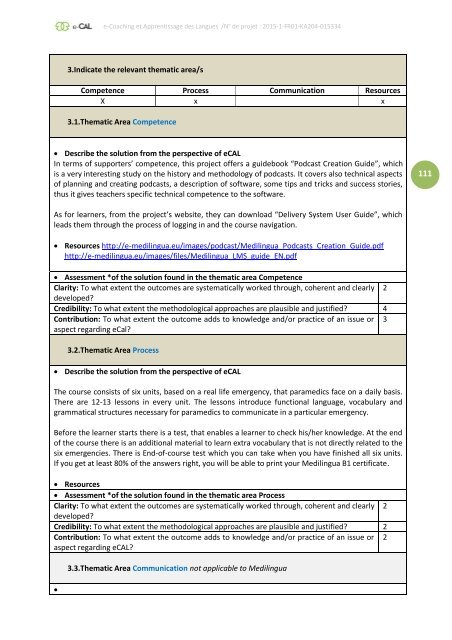e-CAL - e-Coaching et Apprentissage des Langues
The ERASMUS+ project e-CAL presents the result of an analysis of support methods in the case of language learning using web-based Open Educational Resources (OER).
The ERASMUS+ project e-CAL presents the result of an analysis of support methods in the case of language learning using web-based Open Educational Resources (OER).
You also want an ePaper? Increase the reach of your titles
YUMPU automatically turns print PDFs into web optimized ePapers that Google loves.
e-<strong>Coaching</strong> <strong>et</strong> <strong>Apprentissage</strong> <strong>des</strong> <strong>Langues</strong> /N° de proj<strong>et</strong> : 2015-1-FR01-KA204-015334<br />
3.Indicate the relevant thematic area/s<br />
Comp<strong>et</strong>ence Process Communication Resources<br />
X x x<br />
3.1.Thematic Area Comp<strong>et</strong>ence<br />
Describe the solution from the perspective of e<strong>CAL</strong><br />
In terms of supporters’ comp<strong>et</strong>ence, this project offers a guidebook “Podcast Creation Guide”, which<br />
is a very interesting study on the history and m<strong>et</strong>hodology of podcasts. It covers also technical aspects<br />
of planning and creating podcasts, a <strong>des</strong>cription of software, some tips and tricks and success stories,<br />
thus it gives teachers specific technical comp<strong>et</strong>ence to the software.<br />
111<br />
As for learners, from the project’s website, they can download “Delivery System User Guide”, which<br />
leads them through the process of logging in and the course navigation.<br />
Resources http://e-medilingua.eu/images/podcast/Medilingua_Podcasts_Creation_Guide.pdf<br />
http://e-medilingua.eu/images/files/Medilingua_LMS_guide_EN.pdf<br />
Assessment *of the solution found in the thematic area Comp<strong>et</strong>ence<br />
Clarity: To what extent the outcomes are systematically worked through, coherent and clearly 2<br />
developed?<br />
Credibility: To what extent the m<strong>et</strong>hodological approaches are plausible and justified? 4<br />
Contribution: To what extent the outcome adds to knowledge and/or practice of an issue or 3<br />
aspect regarding eCal?<br />
3.2.Thematic Area Process<br />
Describe the solution from the perspective of e<strong>CAL</strong><br />
The course consists of six units, based on a real life emergency, that paramedics face on a daily basis.<br />
There are 12-13 lessons in every unit. The lessons introduce functional language, vocabulary and<br />
grammatical structures necessary for paramedics to communicate in a particular emergency.<br />
Before the learner starts there is a test, that enables a learner to check his/her knowledge. At the end<br />
of the course there is an additional material to learn extra vocabulary that is not directly related to the<br />
six emergencies. There is End-of-course test which you can take when you have finished all six units.<br />
If you g<strong>et</strong> at least 80% of the answers right, you will be able to print your Medilingua B1 certificate.<br />
Resources<br />
Assessment *of the solution found in the thematic area Process<br />
Clarity: To what extent the outcomes are systematically worked through, coherent and clearly 2<br />
developed?<br />
Credibility: To what extent the m<strong>et</strong>hodological approaches are plausible and justified? 2<br />
Contribution: To what extent the outcome adds to knowledge and/or practice of an issue or 2<br />
aspect regarding e<strong>CAL</strong>?<br />
<br />
3.3.Thematic Area Communication not applicable to Medilingua


